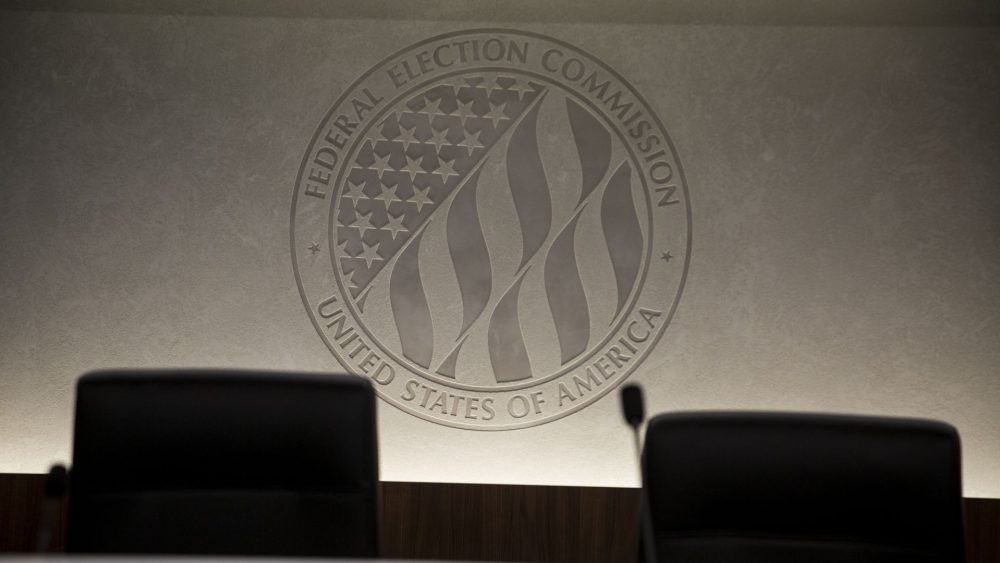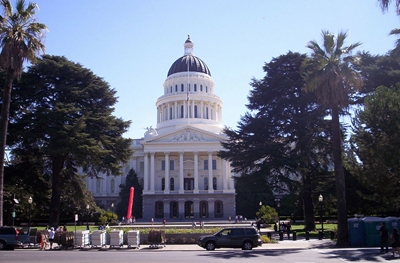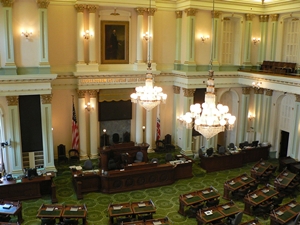January 19, 2021 •
FEC Advisory Opinion: U.S. Citizens Living Abroad May Purchase Political Advertising

FEC; Photo: Sarah Silbiger/CQ Roll Call
In one of its first decisions of 2021, the Federal Election Commission (FEC) released an Advisory Opinion agreed upon unanimously. Advisory Opinion 2020-02 does not break new ground, but affirms that citizens of the United States living abroad may purchase […]
In one of its first decisions of 2021, the Federal Election Commission (FEC) released an Advisory Opinion agreed upon unanimously. Advisory Opinion 2020-02 does not break new ground, but affirms that citizens of the United States living abroad may purchase online political advertisements in the U.S.
The FEC stated campaign finance regulations do not distinguish between citizens living in the U.S. and those residing abroad. They affirmed U.S. citizens living abroad may make expenditures, independent expenditures, and disbursements in connection with elections in the United States.
The opinion arises from a query of a U.S. citizen living in Canada wanting to purchase a political advertisement on Facebook. According to the Advisory Opinion, Facebook requires those purchasing political advertisements provide a U.S. address and to make payments from a U.S. bank account in U.S. dollars, which would preclude the requestor from purchasing the advertising.
While not ruling on Facebook’s preconditions for the purchase of an advertisement, the FEC stated the federal campaign finance law does not require a purchaser to provide Facebook or any other media platform proof of a U.S. bank account or a U.S. residential address. The federal regulations also do not require payment be made from financial instruments drawn on a U.S. bank.
The full six seats of the FEC have only been occupied since December 9, when the U.S. Senate confirmed three new commissioners. This allowed the FEC, where only three of the agency’s six seats were filled since July 4, to be able to conduct official business. The FEC requires at least four commissioners to agree on any official action.
February 17, 2020 •
Judge Set to Confirm Most of San Francisco Political Ad Disclosure Rules

San Francisco, California - Noahnmf
U.S. District Judge Charles Breyer will uphold the bulk of a San Francisco ordinance requiring political ads to disclose top donors and secondary funding sources. Proposition F requires print, audio, and video political ads disclose the top three donors who […]
U.S. District Judge Charles Breyer will uphold the bulk of a San Francisco ordinance requiring political ads to disclose top donors and secondary funding sources.
Proposition F requires print, audio, and video political ads disclose the top three donors who contributed at least $5,000. If one of those donors is a PAC, the committee’s top two donors must also be disclosed.
The judge rejected claims the ad disclosure law hinders political speech.
Yes on Prop B argued the law unconstitutionally burdens its right to free speech and cited an en banc Ninth Circuit panel decision in American Beverage Association v. San Francisco blocking the city from requiring health warnings taking up 20% of billboard ads for sodas and sweetened drinks.
Judge Breyer found the court decision was not really on point because Proposition F was passed by a voter referendum and regulates political speech as opposed to commercial speech.
The judge also rejected an argument donor information is easily accessible on the San Francisco Ethics Commission website stating putting the onus on voters to look up the information would not match the law’s intent.
While refusing to block most of the law, Judge Breyer agreed requiring lengthy disclaimers for small print and short length political ads is likely unconstitutional and indicated he will issue a partial injunction blocking those types of restrictions.
August 31, 2016 •
Deadline Looms for Final Votes in the California Legislature
The California Legislature has been very active in the days leading up to the August 31 deadline for each house to pass bills. On August 30, Assembly Bill 700, a measure that would impose new disclosure requirements for political advertisements, […]
 The California Legislature has been very active in the days leading up to the August 31 deadline for each house to pass bills. On August 30, Assembly Bill 700, a measure that would impose new disclosure requirements for political advertisements, failed by a single vote in the Senate.
The California Legislature has been very active in the days leading up to the August 31 deadline for each house to pass bills. On August 30, Assembly Bill 700, a measure that would impose new disclosure requirements for political advertisements, failed by a single vote in the Senate.
Senate Bill 1349 had better luck gaining passage yesterday and is headed for Gov. Jerry Brown’s desk. SB 1349 will require changes to Cal-Access, California’s outdated online campaign contribution and lobbying database.
Photo of the California State Capitol by Griffin5 on Wikimedia Commons.
February 8, 2016 •
California Campaign Finance Bill Passes Assembly
The State Assembly has passed a campaign finance bill requiring many political advertisements to prominently display or announce the names of the ad sponsor’s top donors of $50,000 or more. Assembly Bill 700 requires the true source of funds to […]
 The State Assembly has passed a campaign finance bill requiring many political advertisements to prominently display or announce the names of the ad sponsor’s top donors of $50,000 or more. Assembly Bill 700 requires the true source of funds to be disclosed, making efforts to hide contributions using middleman organizations or earmarked funds impermissible.
The State Assembly has passed a campaign finance bill requiring many political advertisements to prominently display or announce the names of the ad sponsor’s top donors of $50,000 or more. Assembly Bill 700 requires the true source of funds to be disclosed, making efforts to hide contributions using middleman organizations or earmarked funds impermissible.
The bill is currently under consideration in the Senate.
Photo of the California State Assembly chamber by David Monniaux on Wikimedia Commons.
September 24, 2014 •
Wednesday Government Relations News
Lobbying “Lobbying World” in The Hill. “Americans Are O.K. With Big Business. It’s Business Lobbying Power They Hate.” by Neil Irwin in The New York Times. “TechAmerica Axes Top Government Representative” in Government Technology. Campaign Finance “Study: Major companies are […]
 Lobbying
Lobbying
“Lobbying World” in The Hill.
“Americans Are O.K. With Big Business. It’s Business Lobbying Power They Hate.” by Neil Irwin in The New York Times.
“TechAmerica Axes Top Government Representative” in Government Technology.
Campaign Finance
“Study: Major companies are increasingly disclosing their political spending” by Tom Hamburger in The Washington Post.
“Why the Billionaires Got Bupkus” by Michael Lind in Politico Magazine.
“D’Souza Avoids Prison in Campaign Finance Case” by Jonathan Mahler in The New York Times.
Maine: “Groups’ spending on Maine elections hits record $4.6 million” by Steve Mistler in the Portland Press Herald.
San Diego, California: “Leaders OK campaign crackdown” by David Garrick in The San Diego Union-Tribune.
Ethics
“Lawmakers push for new limits to political intelligence brokers” by Peter Schroeder in The Hill.
“QUIZ: Do You Know How to Be an Ethical Political Appointee?” by Eric Katz in Government Executive.
Georgia: “AG’s office pays $10,000 fine in ethics commission case” by Aaron Gould Sheinin in The Atlanta Journal-Constitution.
Georgia: “DeKalb Commission releases money for ethics investigations” by Mark Niesse in The Atlanta Journal-Constitution.
Political Advertising
“When NOT to Air Political Ads on TV” by Abby Livingston in Roll Call.
Minnesota: “Minnesota campaign regulators give social media advice, suggest online posts carry disclaimers” by The Associated Press in the Star Tribune.
Missouri: “Few 2014 campaign TV ads in Missouri” by The Associated Press in the Springfield News-Leader.
Elections
Florida: “Hillary Clinton to campaign for Charlie Crist” by Maggie Haberman in Politico.
North Carolina: “N.C. sees rise in unaffliated voters” by Benjamin Brown in the Charlotte Observer.
Legislative Sessions
Montana: “Legislative Update September 2014” by Sen. Matt Rosendale in The Roundup.
Utah: “2015 Legislature Could See Record Number of Bills” by Bob Bernick in Utah Policy.
Tech and Social Media
“Procurement: What if We’re Doing it Wrong?” by Mark Headd in Government Technology.
August 26, 2014 •
Tuesday Lobbying and Campaign Finance News Update
Lobbying “GOP staffers seek to cash in as odds grow of Senate takeover” by Megan R. Wilson in The Hill. “How the Lobbying Top Tier explains an influence paradox” by Lee Drutman, Matt Grossmann, and Tim LaPira in the Sunlight […]
 Lobbying
Lobbying
“GOP staffers seek to cash in as odds grow of Senate takeover” by Megan R. Wilson in The Hill.
“How the Lobbying Top Tier explains an influence paradox” by Lee Drutman, Matt Grossmann, and Tim LaPira in the Sunlight Foundation Blog.
Massachusetts: “Martha Coakley owns up to lobbyist-held fundraiser” by Chris Cassidy in the Boston Herald.
Campaign Finance
“Election Panel Enacts Policies by Not Acting” by Nick Confessore in The New York Times.
“Joe Biden’s secret fundraisers” by Edward-Isaac Dovere and Tarini Parti in Politico.
“The PAC to End All PACs Is a Farce” by Walter Shapiro in Politico Magazine.
“Millennial PAC tries to inject youth, diversity into graying legislatures” by Aliyah Frumin in MSNBC.
Alabama: “Did Alabama state candidates violate law by taking money from Congressman Bonner’s campaign?” by Brenda Kirby in AL.com.
Alabama: “Alabama Attorney General’s office drops criminal charges against Lowell Barron” by Paul Gattis in AL.com.
Tennessee: “State auditing Brenda Radford’s campaign finance report” by Stephanie Ingersoll in The Leaf-Chronicle.
Ethics
Florida: “Scott campaign, GOP have paid $227K for use of jet” by Steve Bousquet in the Miami Herald Blog.
Georgia: “Judge hears arguments on call for sanctions in ethics commission saga” by Aaron Gould Sheinin in The Atlanta Journal Constitution.
Elections
“Ten weeks out from Election Day, is a Republican wave coming?” by Domenico Montanaro, Terence Burlij, Rachel Wellford and Simone Pathe in PBS NewsHour.
Arizona: “Arizona primary election: 5 key races to watch” by Alia Beard Rau in The Republic.
Political Advertising
“The 2014 digital ad juggernaut” by Darren Samuelsohn in Politico.
“New regs for Wednesday: TV ads, military health plans, truck drivers’” by Tim Devaney in The Hill.
“Political TV ads will soon know who you are” by Jon Fingas in Engadget.
September 11, 2012 •
Political Spending on Television Ads Making the News
Estimated to reach $5.2 billion
 “Swing-State Stations Are Election Winners” by Amy Schatz and Suzanne Vranica in the Wall Street Journal.
“Swing-State Stations Are Election Winners” by Amy Schatz and Suzanne Vranica in the Wall Street Journal.
“Political Spending on Television Media Projected to Reach $5.2 billion” by Cirina Catania in Technorati.
“Political Ad Season Has Really Begun” by Elspeth Reeve in The Atlantic.
“Political Perceptions: Ad Burnout Ahead?” by Gerald F. Seib in the Wall Street Journal.
“Ind. political ads suspended on 9/11” by The Associated Press in WISH TV.
“Ads: A state-by-state breakdown of who’s spending where” by Domenico Montanaro on NBC News.
July 24, 2012 •
Campaign Finance, Campaign Ads, and Ethics in the News
You’ll find many articles in today’s campaign finance and ethics news summary:
 Campaign Finance
Campaign Finance
“Apps to Identify Who Backs Political Ads” in Government Technology.
“Romney-Obama Lawyers Raking in Millions” by Jonathan D. Salant in Bloomberg News.
Massachusetts: “Mass. groups take aim at Citizens United” in the Patriot Ledger.
Montana: “Group seeks to take measure saying corporations aren’t people off ballot” by Charles S. Johnson in the Billings Gazette.
Campaign Ads
“Ad-Rating Project Will Assess Campaign TV Spots by Asking Voters” by Gregory Giroux on Bloomberg News.
“Voters Say They Are Wary of Ads Made Just for Them” by Tanzina Vega in The New York Times.
“Obama, Romney Attack Ads Top Charts” by Tim Hanrahan in The Wall Street Journal.
“Obama puts $46.7M into ads, outspends what he raised in June” by Fredreka Schouten and Christopher Schnaars in USA Today.
“Report: Super PACs make up 80 percent of Romney ad spending” by Chris Moody in ABC News.
“Florida PAC Lets Internet Users Create Own Voiceovers For Romney Campaign Ad” by Sarah Lai Stirland in TechPresident.
Ethics
Arizona: “Legislator files ethics complaint against another” by The Associated Press in the Arizona Daily Sun.
Georgia: “Governor admits to ethics missteps, but major cases dismissed” by Aaron Gould Sheinin in the Atlanta Journal-Constitution.
April 30, 2012 •
Today’s News Roundup
Keep up with the latest campaign finance, ethics, and government tech news:
 Campaign Finance
Campaign Finance
“FCC’s political ad rule disappoints supporters and foes alike” by Andrew Feinberg in The Hill.
“The FCC Makes Campaign Finance (a Bit) More Transparent” by Kirsten Salyer in Bloomberg.
“FCC Approves Political Ad Rule” by Amy Schatz in The Wall Street Journal.
Ethics
“Former State Senator Is Sentenced to 7 Years in Vast Bribery Case” by Benjamin Weiser in The New York Times.
“Illinois Gov. Ryan’s Corruption Appeal Sent Back to Lower Court” by The Associated Press in Governing.
“Aaron Schock hit with FEC complaint” by John Bresnahan in Politico.
Campaign and Government Tech
“With the 2012 Election Looming, NRCC Names a New Digital Director” by Nick Judd in TechPresident.
“Philadelphia Embraces The World Of Open Data” by Sarah Lai Stirland in TechPresident.
State and Federal Communications, Inc. provides research and consulting services for government relations professionals on lobbying laws, procurement lobbying laws, political contribution laws in the United States and Canada. Learn more by visiting stateandfed.com.

